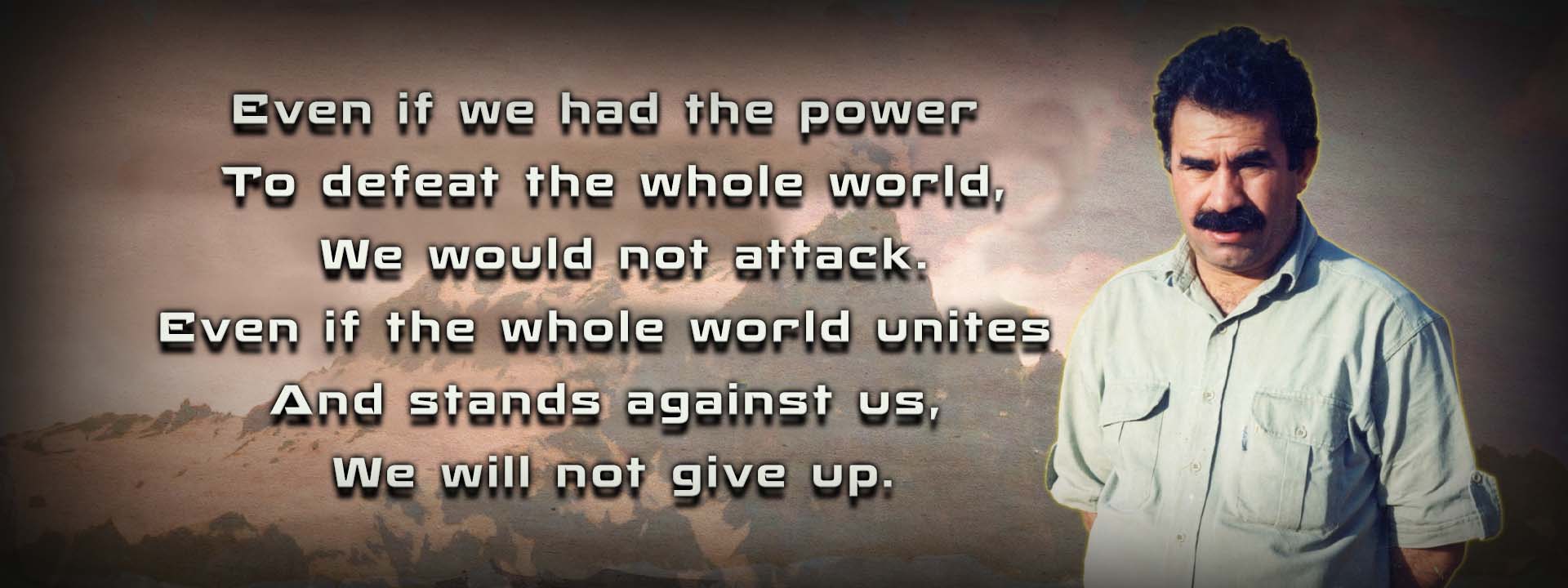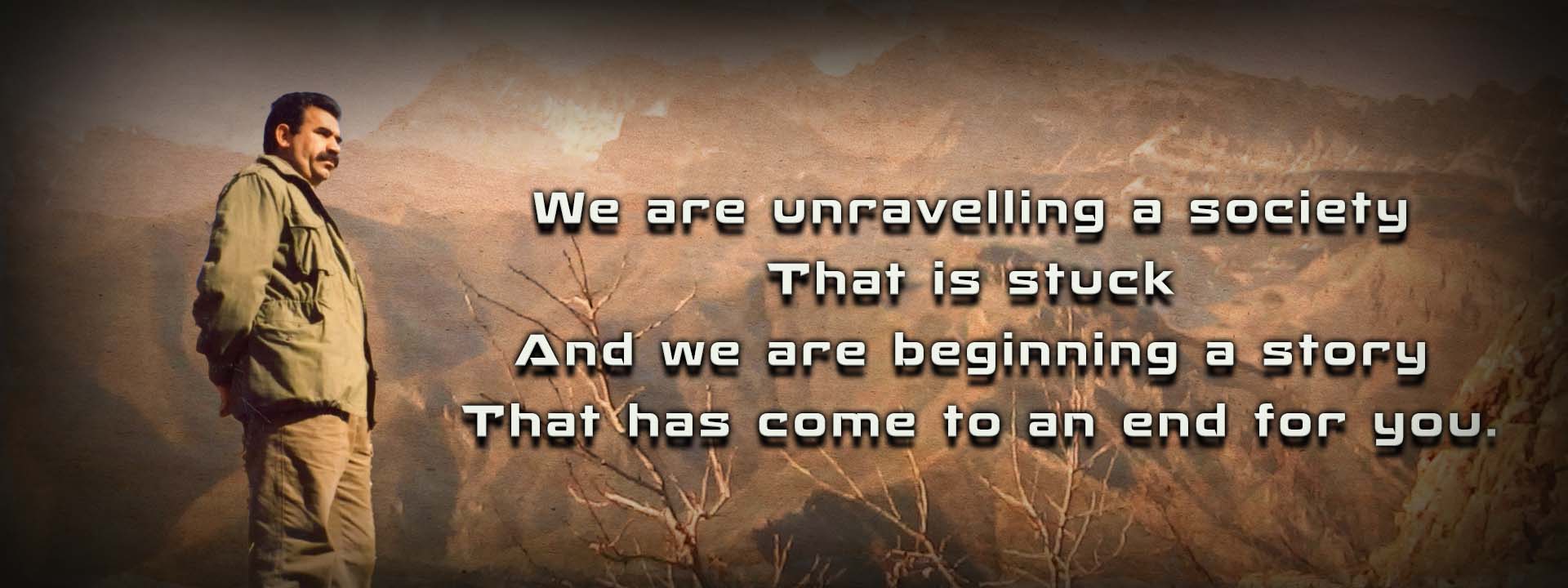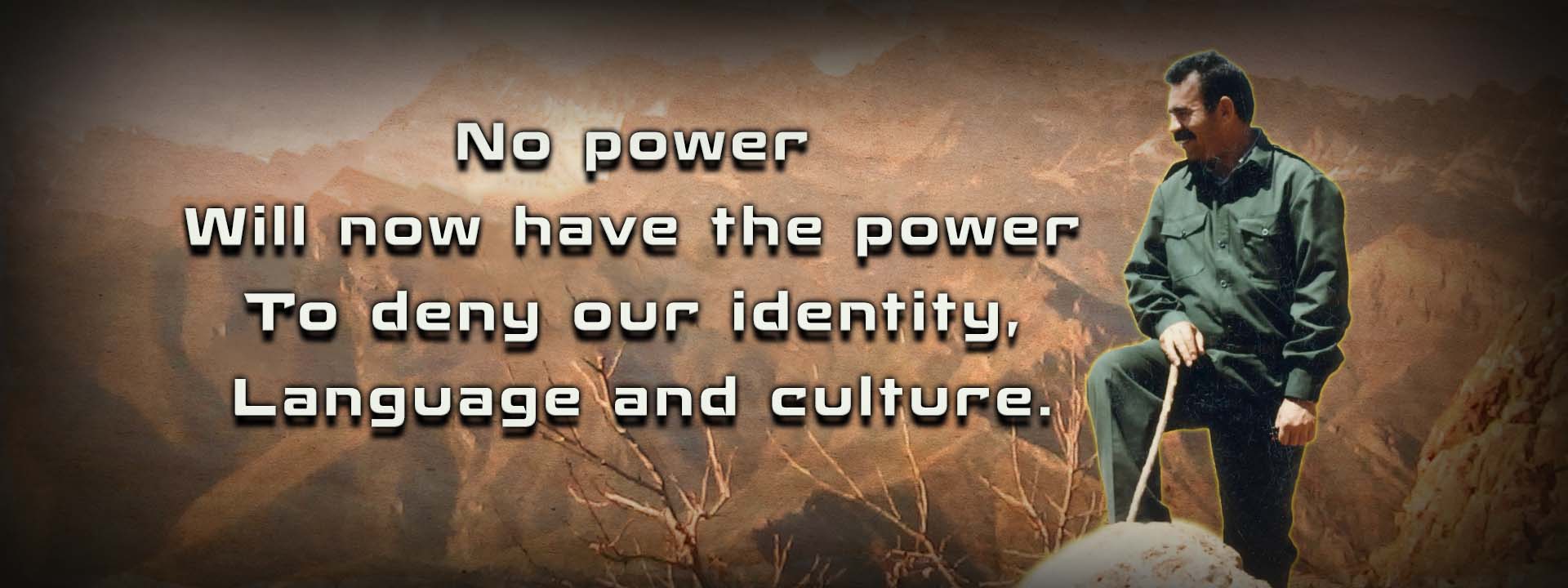 The national question is not a phantasm of capitalist modernity. Nevertheless it was capitalist modernity which imposed the national question on society. The nation replaced the religious community. However, the transition to a national society needs the overcoming of capitalist modernity if the nation is not to remain the disguise for repressive monopolies. As negative as the over-emphasis of the national category in the Middle East is, as severe would be the consequences of neglecting the collective national aspect. Therefore the method in handling the issue should not be ideological but scientific and not nation-statist but based on the concept of the democratic nation and democratic communalism. Theseconcepts are the fundamental elements of democratic modernity. Over the past two centuries nationalism and the tendency towards nation-states have been fuelled in Middle Eastern societies. National issues have not been solved but rather have been aggravated in all areas of society. Instead of cultivating productive competition, capital has enforced internal and external wars in the name of the nation-state. The theory of communalism would be an alternative to capitalism. In the framework of democratic nations, which do not strive for power monopolies, it may lead to peace in a region which has only been the field of gory wars and genocides. In this context we can speak of four majority nations: Arabs, Persians, Turks, and Kurds. I do not wish to divide nations into majority or minority as I do not find this to be appropriate. But due to demographic considerations I shall speak of majority nations. In the same context we may also use the term minority nations.
The national question is not a phantasm of capitalist modernity. Nevertheless it was capitalist modernity which imposed the national question on society. The nation replaced the religious community. However, the transition to a national society needs the overcoming of capitalist modernity if the nation is not to remain the disguise for repressive monopolies. As negative as the over-emphasis of the national category in the Middle East is, as severe would be the consequences of neglecting the collective national aspect. Therefore the method in handling the issue should not be ideological but scientific and not nation-statist but based on the concept of the democratic nation and democratic communalism. Theseconcepts are the fundamental elements of democratic modernity. Over the past two centuries nationalism and the tendency towards nation-states have been fuelled in Middle Eastern societies. National issues have not been solved but rather have been aggravated in all areas of society. Instead of cultivating productive competition, capital has enforced internal and external wars in the name of the nation-state. The theory of communalism would be an alternative to capitalism. In the framework of democratic nations, which do not strive for power monopolies, it may lead to peace in a region which has only been the field of gory wars and genocides. In this context we can speak of four majority nations: Arabs, Persians, Turks, and Kurds. I do not wish to divide nations into majority or minority as I do not find this to be appropriate. But due to demographic considerations I shall speak of majority nations. In the same context we may also use the term minority nations.
1. There are more than twenty Arab nation-states which divide the Arab community and damage their societies by wars. This is one of the main factors responsible for the alienation of cultural values and the apparent hopelessness of the Arab national question. These nation-states have not even been able to form a cross-national economic community. They are the main reason of the problematic situation of the Arab nation. A religiously motivated tribal nationalism together with a sexist patriarchal society pervades all areas of society resulting in distinct conservatism and slavish obedience. Nobody believes that the Arabs will be able to find an Arab national solution to their internal and cross-national problems. However, democratisation and a communalist approach might provide such a solution. Their weakness towards Israel, which the Arab nation-states regard as a competitor, is not only the result of international support to Israel by hegemonic powers. Rather, it is the result of strong internal democratic and communal institutions within Israel. Over the last century, the society of the Arab nation has been weakened by radical nationalism and Islamism. Yet, if they are able to unite communal socialism, which they are not strangers to, with an understanding of a democratic nation, then they may be able to find themselves a secure, long-term solution.
2. The Turks and Turkmens form another influential nation. They share a similar understanding of power and ideology with the Arabs. They are strict nation-statists and have a profound religious and racial nationalism engraved in them. From a sociological point of view, the Turks and Turkmens are quite different. The relations between Turkmen and Turkish aristocracy resemble the tensed relations between Bedouins and Arab aristocracy. They form a stratum whose interests are compatible with democracy and communalism. Their national problems are quite complex. The power strive of the nation-state, distinct nationalism and a sexist patriarchal society prevail and create a very conservative society. The family is regarded as the smallest unit of the state. Both individuals and institutions have taken in these aspects. Turkish and Turkmen communities struggle for power. Other ethnic groups are subjected to a distinct policy of subjugation. The centralist power structures of the Turkish nation-state and the rigid official ideology have prevented a solution to the Kurdish question until today. Society is made to believe that there is no alternative to the state. There is no balance between the individual and the state. Obedience is regarded as the greatest virtue. In contrast to this, the theory of democratic modernity offers an adequate approach to all national communities in solving their national problems. A community based project of a democratic Turkish confederation would both strengthen its internal unity and create the conditions for a peaceful coexistence with its neighbours. Borders have lost there former meaning when it comes to social unity. In spite of geographic boundaries today’s modern communication tools allow for a virtual unity between individuals and communities wherever they are. A democratic confederation of the Turkish national communities could be a contribution to world peace and the system of democratic modernity.
3. The Kurdish national society is very complex. Worldwide, the Kurds are the biggest nation without a state of their own. They have been settling in their present settlement areas since the Neolithic Age. Agriculture and stock breeding as well as their readiness to defend themselves using the geographic advantages of their mountainous homeland helped the Kurds to survive as a native people. The Kurdish national question rises from the fact that they have been denied their right to nationhood. Others tried to assimilate them, annihilate them, and in the end flatly denied their existence. Not having a state of their own has advantages and disadvantages. The excrescences of state-based civilisations have only been taken in to a limited extent. This can be a benefit in the realisation of alternative social concepts that go beyond capitalist modernity. Their settlement area is divided by the national borders of four states and lies in a geo-strategically important region, thus providing the Kurds a strategic advantage. The Kurds do not have the chance to form a national society through the use of state-power. Although there is a Kurdish political entity today in Iraqi-Kurdistan, it is not a nation-state but rather a parastatal entity. Kurdistan had also been home to Armenian and Aramaic minorities before these fell victims to genocides. There are also smaller groups of Arabs and Turks. Even today there are many different religions and faiths living side by side there. Also there are rudiments of clan and tribal culture while almost no presence of urban culture there. All these properties are a blessing for new democratic political formations. Communal cooperatives in farming and also in the water economy and the energy sector offer themselves as ideal ways of production. The situation is also favourable for the development of an ethical political society. Even the patriarchal ideology is less deeply rooted here than in the neighbouring societies. This is beneficial for the establishment of a democratic society where women’s freedom and equality are to form one of the main pillars. It also offers the conditions for the creation of a democratic environment-friendly nation in line with the paradigm of democratic modernity. The construction of a democratic nation based on multi-national identities is the ideal solution when faced with the cul-de-sac that is the nation-state. The emerging entity could become a blueprint for the entire Middle East and expand dynamically into neighbouring countries. Convincing the neighbouring nations of this model shall change the fate of the Middle East and shall reinforce the chance of democratic modernity to create an alternative. In this sense, the freedom of the Kurds and the democratisation of their society would be synonymous with the freedom of the whole region and its societies.
4. The Persian or Iranian nation’s contemporary problems can be found in the interventions of historical civilisations and capitalist modernity. Although their original identity comes from Zoroastrian and Mithraic tradition, these have been annulled by a derivative of Islam. Manichaeism,which emerged as a synthesis of Judaism, Christianity, Mohammedanism andGreek philosophy, was not able to prevail against the ideology of the official civilisation, Islam. Hence it has converted the Islamic tradition into Shi’ah denomination and adopted it to be its latest civilisational ideology. Presently there are efforts made to modernise itself by passing the elements of capitalist modernity through its Shi’ah filter. Iranian society is multi-ethnic and multi-religious and blessed with a rich culture. All the national and religious identities of the Middle East can be found there. This diversity is in strong contrast to the hegemonic claim of the theocracy, which cultivates a subtle religious nationalism and the ruling class does not shrink back from anti-modernist propaganda whenever it serves their interests. Revolutionary and democratic tendencies have been integrated by the traditional civilisation. A despotic regime skilfully governs the country. The negative effects of American and European sanctions are not negligible here. Despite strong centralist efforts in Iran, from the grass-roots already some kind of federalism exists. When elements of democratic civilisation and federalist elements including Azeris, Kurds, Baluchis, Arabs, and Turkmens intersect, the project of a “Democratic Confederation of Iran” can emerge and become attractive. Women’s movements and communal traditions will play a special role here.
5. The Armenian national question contains one of the greatest tragedies that the progress of capitalist modernity has brought about in the Middle East. The Armenians are an ancient people. They shared much of their settlement area with the Kurds. While the Kurds lived primarily on agriculture and animal husbandry the Armenians engaged in arts and crafts. Just like the Kurds, the Armenians cultivated a tradition of self-defence. Apart from some short episodes the Armenians never successfully founded a state. They rely on Christian culture which gives them their identity and their faith in salvation. Because of their religion they often suffered repression at the hands of the Muslim majority. Hence, the emerging nationalism bore fruit with the Armenian bourgeoisie. Soon there were differences with the Turkish nationalists, eventually ending in the genocide of the Armenians by the Turks. Apart from the Jews, the Armenians are the second-largest people who live primarily in the Diaspora. The foundation of an Armenian state in the west of Azerbaijan, however, did not solve the Armenian national question. The consequences of the genocide can hardly be put into words. The search for the lost country defines their national psyche and is at the heart of the Armenian question. The issue is aggravated by the fact that these areas have been settled into by other people since then. Any concepts based on a nation-state cannot offer a solution. There is neither a homogenous population structure there nor any clear borders as is required by capitalist modernity. Confederate structures could be an alternative for the Armenians. The foundation of a democratic Armenian nation in line with the paradigm of democratic modernity promises the Armenians an opportunity to reinvent themselves. It could enable them to return to their historical homeland in the cultural plurality of the Middle East. In the event that they renew themselves under the Armenian democratic nation not only shall they continue to play their historical role within Middle Eastern culture, but shall also find the right path to liberation.
6. In modern times the Christian Arameans (Assyrians) also suffered the fate of the Armenians. They too are one of the oldest people in the Middle East. They shared a settlement area with the Kurds but also with other people. Like the Armenians they suffered from the repression of the Muslim majority, paving the way for European-style nationalism among the Aramean bourgeoisie. Eventually the Arameans too fell victim to genocide at the hands of the Turks under the leadership of the fascist Committee of Unity and Progress. The collaborationist Kurds lent a helping hand in this genocide. The question of Aramean national society has its roots in civilisation but has also become complicated with Christianity and the ideologies of modernity. For a solution there is a need for a radical transformation of the Arameans. Their real salvation may be to break away from the mentality of classical civilisation and capitalist modernity and instead embrace democratic civilisation and renew their rich cultural memory as an element of democratic modernity in order to re-construct themselves as the “Aramean Democratic Nation”.
7. The history of the Jewish people also gives expression to the overall problematic cultural history of the Middle East. The history of expulsion, pogroms and genocide amounts to balancing the accounts of civilisations. The Jewish community has taken up the influences of the old Sumerian and Egyptian cultures as well as those of regional tribal cultures. It has contributed a lot to the culture of the Middle East. Like the Arameans they fell victim to the extreme developments of modernity. Against this background, intellectuals of Jewish descent developed a complex point of view towards these issues. However, this is nowhere near enough. For a solution of the problems as they exist today a renewed appropriation of the history of the Middle East is needed on a democratic basis. The Israeli nation-state is at war since its foundation. The slogan is: an eye for an eye. Fire cannot be fought by fire, though. Even if Israel enjoys relative security thanks to its international support, this is not a sustainable solution. Nothing will be permanently safe as long as capitalist modernity has not been overcome. The Palestine conflict makes it clear that the nation-state paradigm is not helpful for a solution. There has been much blood-shed; what remains is the difficult legacy of seemingly irresolvable problems. The Israel-Palestine example shows the complete failure of capitalist modernity and the nation-state. The Jews belong to the culture bearers of the Middle East. Denial of their right to existence is an attack on the Middle East. Their transformation into a democratic nation just as for Armenians and Arameans would make their participation in a democratic confederation of the Middle East easier. The project of an “East-Aegean Democratic Confederation” would be a positive start. Strict and exclusive national and religious identities may evolve into flexible and open identities under this project. Israel may also evolve into a more acceptable open democratic nation. Undoubtedly though, its neighbours must also go through such a transformation. Tensions and armed conflicts in the Middle East make a transformation of the paradigm of modernity seem inevitable. Without it a solution to the difficult social problems and national questions is impossible. Democratic modernity offers an alternative to the system that is unable to resolve problems.
8. The annihilation of Hellenic culture in Anatolia is a loss that cannot be compensated. The ethnic cleansing arranged by the Turkish and Greek nation-states in the first quarter of the last century has left its mark. No state has the right to drive people from their ancestral cultural region. Nevertheless, nation-states have shown their inhuman approach towards such issues again and again. The attacks on the Hellenic, Jewish, Aramean and Armenian cultures were exacerbated while Islam spread through-out the Middle East. This, in turn, contributed to the decline of Middle-Eastern Civilisation. Islamic culture has never been able to fill the emerging void. In the 19th century when capitalist modernity advanced into the Middle East it found a cultural desert created by self-inflicted cultural erosion. Cultural diversity also strengthens the defence mechanism of a society. Monocultures are less robust. Hence, the conquest of the Middle East has not been difficult. The project of a homogeneous nation as propagated by the nation-states furthered their cultural decline.
9. The Caucasian ethnic groups also have social problems which are not insignificant. Again and again they have migrated into the Middle East and stimulated its cultures. They have unquestionably contributed to its cultural wealth. The arrival of modernity almost made these minority cultures disappear. They too, would find their adequate place in a confederate structure.
Finally, let me state again that the fundamental problems of the Middle East are deeply rooted in class-based civilisation. They have exacerbated with the global crisis of capitalist modernity. This modernity and its claim to dominance cannot offer any solutions nor a long-term perspective for the Middle-East region. The future is democratic confederalism.



